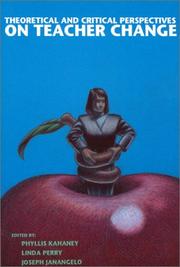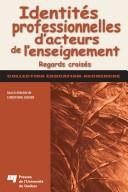| Listing 1 - 6 of 6 |
Sort by
|

ISBN: 1567500595 Year: 1993 Publisher: Norwood, NJ Ablex Pub.
Abstract | Keywords | Export | Availability | Bookmark
 Loading...
Loading...Choose an application
- Reference Manager
- EndNote
- RefWorks (Direct export to RefWorks)
Teaching --- Learning --- Educational change --- Teachers - Attitudes. --- Teachers - Psychology.
Book
ISBN: 9780415539227 9780415539258 0415539226 0415539250 0203108434 9780203108437 9781136265839 9781136265785 9781136265822 Year: 2015 Publisher: New York : Routledge,
Abstract | Keywords | Export | Availability | Bookmark
 Loading...
Loading...Choose an application
- Reference Manager
- EndNote
- RefWorks (Direct export to RefWorks)
Teachers --- Teaching --- Educational psychology --- Education --- Psychology --- Attitudes --- Research --- Teaching. --- Educational psychology. --- Psychology. --- Attitudes. --- Research. --- Educational Psychology. --- Cognitive Psychology. --- General. --- Teachers - Psychology --- Teachers - Attitudes --- Education - Research

ISBN: 9782760515116 2760515117 9782760519527 276051952X 1459334663 9781459334663 Year: 2007 Volume: 27 Publisher: Québec : Presses de l'Université du Québec,
Abstract | Keywords | Export | Availability | Bookmark
 Loading...
Loading...Choose an application
- Reference Manager
- EndNote
- RefWorks (Direct export to RefWorks)
Teachers --- Identity (Psychology) --- School principals --- Teacher educators --- Teaching Practice --- Attitudes --- Attitudes. --- Teachers - Québec (Province) - Attitudes --- Identity (Psychology) - Québec (Province) --- School principals - Québec (Province) - Attitudes --- Teacher educators - Québec (Province) - Attitudes --- Teaching Practice - Québec (Province) --- Teachers - Attitudes
Book
ISBN: 8021098031 8021098023 Year: 2020 Publisher: Brno [Czech Republic] : Masarykova univerzita nakladatelství
Abstract | Keywords | Export | Availability | Bookmark
 Loading...
Loading...Choose an application
- Reference Manager
- EndNote
- RefWorks (Direct export to RefWorks)
The publication describes the research on the attitudes of the teachers of health education or an equivalent course in lower secondary schools. In the theoretical part the issue is explained in a broader context. The types of eating disorders and the factors that contribute to the development of these disorders in childhood and adolescence are described. The following section explains the prevention of risk behaviour with a focus on the role of the school and teachers in the primary prevention of eating disorders. The publication describes how teachers can identify eating disorders and suggests their appropriate behaviour towards children with a suspected eating disorder. The book also focuses on the issue of attitudes. The text refers to relevant domestic and international research studies that illustrate the current state of the issue. The theoretical part of the publication defines the research problem, which is to identify the teachers' attitudes to eating disorders. The main research method is the semantic differential applied on a sample of 166 elementary school teachers from various regions of the Czech Republic. The additional method is the semi-structured interview conducted with some teachers from the research sample. The core focus of the publication is the new knowledge concerning the attitudes of elementary school teachers to eating disorders. The results are analysed in terms of the teachers' qualification, gender, age, and length of teaching experience. The final part of the paper summarizes the most important findings and recommendations for the prevention of eating disorders in educational practice. The new findings can also be applied in foreign educational systems.
Health & personal development --- eating disorders --- teachers’ attitudes --- health education --- elementary education --- prevention of eating disorders --- School education --- Educational Psychology --- Personality Psychology --- Behaviorism --- Health and medicine and law --- Sociology of Education
Book
ISBN: 9788484439301 8484439305 Year: 2014 Publisher: Paris Maison des langues
Abstract | Keywords | Export | Availability | Bookmark
 Loading...
Loading...Choose an application
- Reference Manager
- EndNote
- RefWorks (Direct export to RefWorks)
Des réflexions sur le rôle de la voix et du geste dans l'enseignement des langues, accompagnées de conseils présentés dans des fiches pratiques en fin de chaque partie, pour mettre en application les concepts abordés. ©Electre 2014
Education --- Teachers --- Teaching --- Research --- Attitudes --- Enseignants --- Communication orale --- Expression --- Gestes --- Educational psychology --- Voice --- Psychopédagogie --- Voix --- #KVHA:Taalkunde --- #KVHA:Taalonderwijs --- #KVHA:Lichaamstaal --- Schoolbooks - Didactic material --- Voice. --- Communication orale. --- Expression. --- Gestes. --- Attitudes. --- Educational psychology. --- Didactiek --- Franse taalkunde --- Stembanden --- Lichaamstaal --- Linguïstiek --- Stemband --- Frans --- Verlamming --- Education - Research --- Teachers - Attitudes --- Teaching - Research
Book
ISBN: 9782130810360 2130810365 Year: 2018 Publisher: Paris : Presses universitaires de France,
Abstract | Keywords | Export | Availability | Bookmark
 Loading...
Loading...Choose an application
- Reference Manager
- EndNote
- RefWorks (Direct export to RefWorks)
La part de l'engagement dans la formation, qu'il s'agisse de former ou de se former, est essentielle. Engagement dans le savoir, la parole, la voix et les techniques, engagement corporel jusque dans les maladresses. Prendre des risques, se maintenir dans un processus de création jour après jour à côté des habitudes, des habiletés, des capacités et même des compétences. Pour accompagner et parfois résister, un engagement dans le savoir est-il en effet souhaitable? Être concerné, soi, par le savoir transmis? Attentif à l'autre à qui l'on s'adresse? Mireille Cifali répond à ces questions par l'affirmative. Pour un formateur sont alors dessinées l'articulation fragile entre théories et pratiques, ainsi que la place indispensable réservée à un travail éthique. C'est sur son expérience de clinicienne de la formation que Mireille Cifali s'appuie pour transmettre les valeurs à l'origine de dispositifs où penser est une joie, où se former est un surcroît d'être autant que de savoir.
Educational psychology --- Teachers --- Engagement (Philosophy) --- Interaction analysis in education --- Motivation (Psychology) --- Motivation in education --- Psychoanalysis and education --- Attitudes --- Training of --- Psychologie de l'éducation. --- Enseignants --- Posture. --- Interaction en éducation. --- Formation professionnelle. --- Éducation des adultes. --- Formateurs (éducation des adultes) --- Formation. --- Teachers - Attitudes --- Teachers - Training of --- Psychologie de l'éducation. --- Interaction en éducation. --- Éducation des adultes. --- Formateurs (éducation des adultes). --- Formation
| Listing 1 - 6 of 6 |
Sort by
|

 Search
Search Feedback
Feedback About UniCat
About UniCat  Help
Help News
News